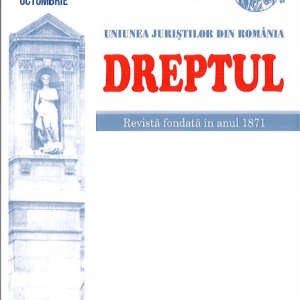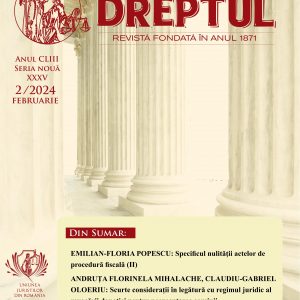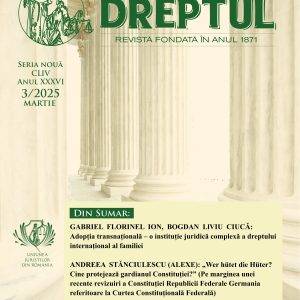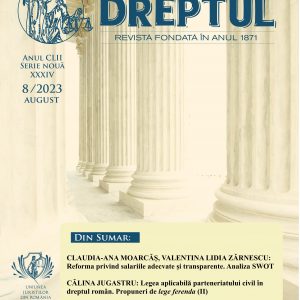-
 The (Romanian) Labour Code (Law No 53/2003 – republished) regulates (Article 88 et seq.) the legal institution of labour law of the „temporary labour contract”, which has Directive 2008/104/EC of 19 November 2008 as „European” legal basis. In the legal literature of labour law from Romania a controversy has arisen, whether the „mission” performed under a „temporary labour contract” may be considered or not as secondment [within the meaning of Article 45 et seq. of the (Romanian) Labour Code]. The position of the author of this study is firm, in a negative way, and, as a result, the employee in question is not entitled to the special rights regulated for the employees on secondment provided by Article 46 (4) and Article 47 of the Labour Code.
The (Romanian) Labour Code (Law No 53/2003 – republished) regulates (Article 88 et seq.) the legal institution of labour law of the „temporary labour contract”, which has Directive 2008/104/EC of 19 November 2008 as „European” legal basis. In the legal literature of labour law from Romania a controversy has arisen, whether the „mission” performed under a „temporary labour contract” may be considered or not as secondment [within the meaning of Article 45 et seq. of the (Romanian) Labour Code]. The position of the author of this study is firm, in a negative way, and, as a result, the employee in question is not entitled to the special rights regulated for the employees on secondment provided by Article 46 (4) and Article 47 of the Labour Code. -
 Rațiunea vulgară ne spune că judecătorul espus electivităței timpurare nu poate avea principala sa însușire, aceea a independenției, garanția imparțialităției sale. Temerea și dorința, aceste două mobile cari au o înrâurire atât de mare asupra acțiunilor noastre, vor aduce o egală atingere libertăței morale a judecătorului, vor fi o piedică stăruitoare a îndeplinirii misiunei sale sociale.
Rațiunea vulgară ne spune că judecătorul espus electivităței timpurare nu poate avea principala sa însușire, aceea a independenției, garanția imparțialităției sale. Temerea și dorința, aceste două mobile cari au o înrâurire atât de mare asupra acțiunilor noastre, vor aduce o egală atingere libertăței morale a judecătorului, vor fi o piedică stăruitoare a îndeplinirii misiunei sale sociale. -
 Very high frequency of facts consisting of possession and sale of cigarettes from smuggling, as well as significant damage to the state budget by committing such acts with adverse consequences exacerbated in the current economic climate, require a consistent jurisprudence to prevent and effectively combat such deeds. Building on the diversity of solutions pronounced by the courts on the legal classification of the offense of possession, outside a fiscal warehouse and by an authorized warehouse-keeper, of unmarked excisable goods for which duty has not been paid and originate form smuggling, the author points out the need to promote a referral in the interests of the law and identifies a possible solution to unify the judicial practice, holding that the said deed meets the constitutive elements of the offenses provided for in art. 2961 par. (1) l) of the Fiscal Code, art. 9 para. (1). a) of Law no. 241/2005 on preventing and combating tax evasion and art. 270 para. (3) of the Customs Code.
Very high frequency of facts consisting of possession and sale of cigarettes from smuggling, as well as significant damage to the state budget by committing such acts with adverse consequences exacerbated in the current economic climate, require a consistent jurisprudence to prevent and effectively combat such deeds. Building on the diversity of solutions pronounced by the courts on the legal classification of the offense of possession, outside a fiscal warehouse and by an authorized warehouse-keeper, of unmarked excisable goods for which duty has not been paid and originate form smuggling, the author points out the need to promote a referral in the interests of the law and identifies a possible solution to unify the judicial practice, holding that the said deed meets the constitutive elements of the offenses provided for in art. 2961 par. (1) l) of the Fiscal Code, art. 9 para. (1). a) of Law no. 241/2005 on preventing and combating tax evasion and art. 270 para. (3) of the Customs Code. -
 According to the regulations of the Romanian pension law, persons who, prior to 1 April 2001, worked in the work groups I and II benefit of a series of easements at the calculation of pension rights, as well as of the reduction of the standard retirement age. In this study, the author examines a rich and interesting case law of the classification into the work groups I and II – according to Orders no. 50/1990 and no. 125/1990 issued by the Minister of Labor and Social Protection, the Minister of Health and the President of the National Labor Protection Commission, with the mentioning that, under certain conditions, these Orders also apply to the persons retiring subsequent to 1 April 2001, but who carried out activities classified in the work groups I and II (according to the above-mentioned Orders) prior to such date.
According to the regulations of the Romanian pension law, persons who, prior to 1 April 2001, worked in the work groups I and II benefit of a series of easements at the calculation of pension rights, as well as of the reduction of the standard retirement age. In this study, the author examines a rich and interesting case law of the classification into the work groups I and II – according to Orders no. 50/1990 and no. 125/1990 issued by the Minister of Labor and Social Protection, the Minister of Health and the President of the National Labor Protection Commission, with the mentioning that, under certain conditions, these Orders also apply to the persons retiring subsequent to 1 April 2001, but who carried out activities classified in the work groups I and II (according to the above-mentioned Orders) prior to such date. -
 The study analyzes the provisions of the Law No 114/2021 on some measures in the field of justice in the context of the COVID-19 pandemic in civil cases. The mentioned normative act provides the conditions for conducting the court hearings in the civil trial by videoconference. The conditions are the following: to be decreed the state of alert instituted in order to prevent and combat the effects of the COVID-19 pandemic also for a period of 30 days from its cessation; to be about a civil case; to have the agreement of the parties in this respect; to have the possibility; the approval of the court of law. The Constitutional Court, by the Decisions No 157/2020 and No 457/2020, has established that the justice cannot stand still, not even during the COVID-19 pandemic, under this requirement the legislator regulating by the Law No 114/2021 the manner of conducting judicial proceedings during this period. However, the legislator did not rise up to the standards imposed by the Constitutional Court of Romania, in the sense that it did not regulate an effective way of access to justice, in the situation where the objective pandemic conditions restrict this possibility. Although we appreciate positively the provisions of the Law No 114/2021 referring to the development of the civil process by electronic means, we consider that the measures ordered should be generalized and not applied, as provided by Article 1 (2), only for reasons generated by the COVID-19 pandemic.
The study analyzes the provisions of the Law No 114/2021 on some measures in the field of justice in the context of the COVID-19 pandemic in civil cases. The mentioned normative act provides the conditions for conducting the court hearings in the civil trial by videoconference. The conditions are the following: to be decreed the state of alert instituted in order to prevent and combat the effects of the COVID-19 pandemic also for a period of 30 days from its cessation; to be about a civil case; to have the agreement of the parties in this respect; to have the possibility; the approval of the court of law. The Constitutional Court, by the Decisions No 157/2020 and No 457/2020, has established that the justice cannot stand still, not even during the COVID-19 pandemic, under this requirement the legislator regulating by the Law No 114/2021 the manner of conducting judicial proceedings during this period. However, the legislator did not rise up to the standards imposed by the Constitutional Court of Romania, in the sense that it did not regulate an effective way of access to justice, in the situation where the objective pandemic conditions restrict this possibility. Although we appreciate positively the provisions of the Law No 114/2021 referring to the development of the civil process by electronic means, we consider that the measures ordered should be generalized and not applied, as provided by Article 1 (2), only for reasons generated by the COVID-19 pandemic. -

-

-
 Law no. 202/2010 on certain measures regarding the acceleration of the settlement of lawsuits, the so-called “small reform”, was adopted in order to accelerate the settlement of lawsuits, by ensuring the swiftness of procedures, both in criminal matters and in civil matters, even before the expected entry into force of the new codes (the Criminal Code, the Criminal Procedure Code, the Civil Code, the Civil Procedure Code). In the field of criminal prosecution, certain provisions of the current Criminal Procedure Code were amended, with a view to ensuring swiftness by eliminating the provisions that required the court intervention for the revocation or termination of certain preventive measures if the prosecutor issues a decision for the non-initiation of court proceedings; however, no amendments were correlatively made to other provisions of the code in relation thereto. Therefore, certain disputes might arise in connection with the implementation of such texts of law.
Law no. 202/2010 on certain measures regarding the acceleration of the settlement of lawsuits, the so-called “small reform”, was adopted in order to accelerate the settlement of lawsuits, by ensuring the swiftness of procedures, both in criminal matters and in civil matters, even before the expected entry into force of the new codes (the Criminal Code, the Criminal Procedure Code, the Civil Code, the Civil Procedure Code). In the field of criminal prosecution, certain provisions of the current Criminal Procedure Code were amended, with a view to ensuring swiftness by eliminating the provisions that required the court intervention for the revocation or termination of certain preventive measures if the prosecutor issues a decision for the non-initiation of court proceedings; however, no amendments were correlatively made to other provisions of the code in relation thereto. Therefore, certain disputes might arise in connection with the implementation of such texts of law. -

-
 The cessation of the natural person’s existence shall result in a series of consequences, such as the succession law, the personality rights, and the natural person’s respect and subsequent to his/her death and so on. This study examines the cessation of the natural person’s existence and its consequences, in the light of the provisions of the applicable Romanian Civil Code (Law no. 287/2009, as republished on 15 July 2011 and come into force on the 1st October 2011), pointing out the new regulations in the matter, as compared to the previous laws (into force until the 1st October 2011).
The cessation of the natural person’s existence shall result in a series of consequences, such as the succession law, the personality rights, and the natural person’s respect and subsequent to his/her death and so on. This study examines the cessation of the natural person’s existence and its consequences, in the light of the provisions of the applicable Romanian Civil Code (Law no. 287/2009, as republished on 15 July 2011 and come into force on the 1st October 2011), pointing out the new regulations in the matter, as compared to the previous laws (into force until the 1st October 2011). -

-
 The Law No 85/2014 on the procedures for preventing insolvency and of insolvency has been recently adopted and has entered into force. Whereas Article 123 (1), (7) and (8) of this Law provides a series of regulations that aim, directly or indirectly, at the „denunciation” of some categories of individual labour contracts of the employees of the debtor (undergoing insolvency) or at the „dissolution” of such contracts, in this study the author examines the above-mentioned problems.
The Law No 85/2014 on the procedures for preventing insolvency and of insolvency has been recently adopted and has entered into force. Whereas Article 123 (1), (7) and (8) of this Law provides a series of regulations that aim, directly or indirectly, at the „denunciation” of some categories of individual labour contracts of the employees of the debtor (undergoing insolvency) or at the „dissolution” of such contracts, in this study the author examines the above-mentioned problems.
